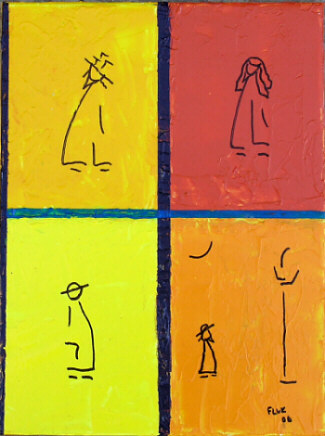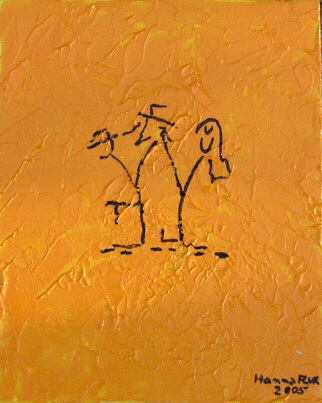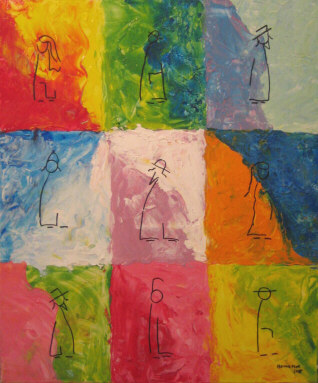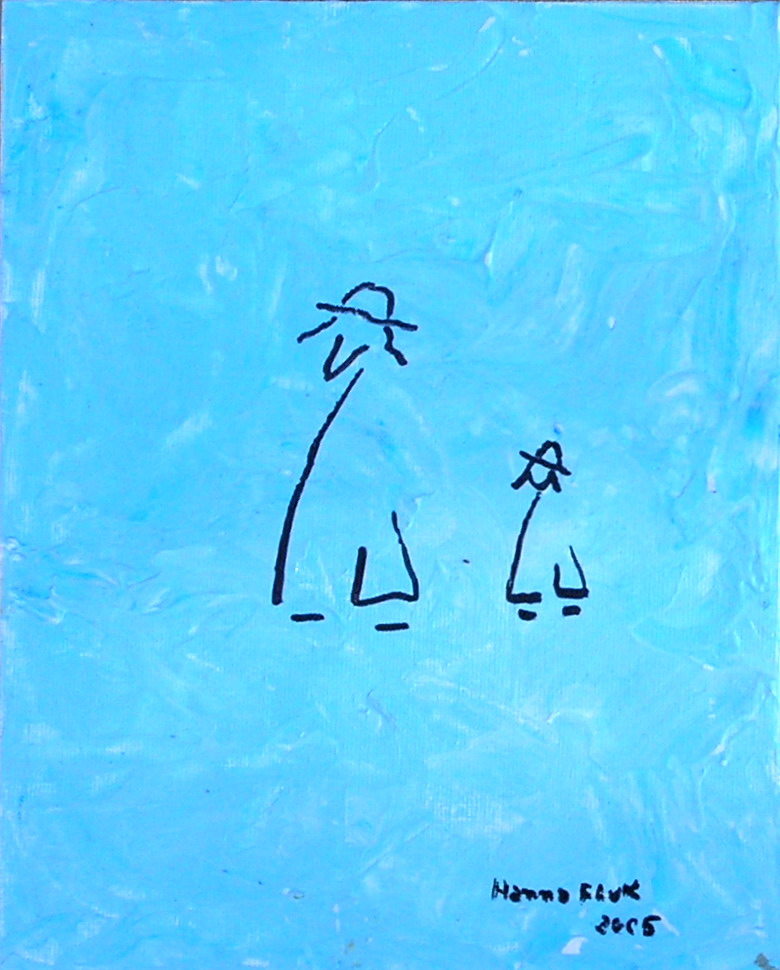 About five years ago I taught English to a group of Hasidic men in North London. I realised when I took the job that I’d never really had contact with ultra-Orthodox Jews, even though I’d lived in Israel for 17 years before coming to London, and before that in a tightly-knit Jewish community in Port Elizabeth, South Africa – a community which now comprises a few dozen families, and a Jewish Museum where once the vibrant Raleigh Street Synagogue stood.
About five years ago I taught English to a group of Hasidic men in North London. I realised when I took the job that I’d never really had contact with ultra-Orthodox Jews, even though I’d lived in Israel for 17 years before coming to London, and before that in a tightly-knit Jewish community in Port Elizabeth, South Africa – a community which now comprises a few dozen families, and a Jewish Museum where once the vibrant Raleigh Street Synagogue stood.
Growing up, there was only one way to be a real Jew, and that was our way, the way the Levins did it, the Conservative way. We ate shrimps and other shell-fish, we drove to shul, my grandfather went hunting for kudu and springbok with his Afrikaner friends. This was our enlightened form of Conservative Judaism. Those who belonged to the Reform movement – people like Auntie Margery who married Uncle Wolfie and converted – were inferior. Frum Jews lived in Johannesburg — if there were any in Port Elizabeth, besides the rabbi, I never saw them. The most religious boy at my Jewish day school wore a yarmulke at all times. We used to taunt him with shouts of “Jew-boy” and try to flick it off his head. He eventually moved to a Jewish boarding school in Jo’berg.
I was fourteen when my family left South Africa for Israel in 1978. When I think of my years in Israel, two main encounters with ultra-orthodox Jews come to mind. The first episode embarrasses me; it is one of three stories I carry around with me like a pervert’s party trick. It happened about two years after my family moved to Israel. It was about 1980; I must have been close to my 17th birthday, still in high-school in Ashkelon. I had already learnt from my classmates the contempt they felt towards the Orthodox, and especially the haredim, or ultra-orthodox. Given the power haredim held in politics and family affairs (especially marriage, divorce, and funerals), it seemed that if you were a young liberal feminist almost-ready-to-come-out gay boy you were expected to hate them.
A few friends were visiting from South Africa on a school trip to Israel. I went to meet them in Jerusalem. We were walking on the outskirts of the Old City, along a wall that must have been the bastion of some ancient Roman fortress. There was a group of haredi men walking below us – I don’t remember how many, maybe just two – and from our elevated position on the wall, I spat at them. I can’t remember if it was symbolic spitting – the kind that is more just the sound of spitting, like we do three times in succession when we mean God-forbid – or if I’d collected saliva from my cheeks, or even snorted up phlegm from the back of my throat.
I remember the look in one of my friends’ eyes, her embarrassment and confusion, as if she’d witnessed something she wished she hadn’t. I remember telling them, with pride, as if showing off my new fluency in Hebrew, how Israelis hated haredim. I don’t remember if the men responded by looking up or walking faster, or if we sped up to get away from them. Despite my speech to my friends, though, there was no real hatred in my actions. I was aping the attitudes of my Israeli schoolmates, trying to fit in, be liked.
A therapist friend has pointed to the degree of self-loathing in my actions, and suggested that the spitting was really about the fear of visibility, and the threat that being seen as a Jew had posed to my safety. Having been bullied at school in South Africa had left its mark — even though I was bullied more for being queer than being a Jew, this dread is older than me. It is our story of persecution, genocide, and detectability.
The second incident happened about six or seven years later.
 I’d done my three years in the army – two years in an office, plus one year in Lebanon as part of Israel’s occupying forces in the early 1980s, where I landed up serving in a Minorities Unit of Druze Arabs and Bedouins; we were ten Jews in a battalion of 350. Everyone spoke Arabic; Feiruz and Farid el-Atrash blared from the radios in our tents; and being in Lebanon meant the guys could visit their relatives. I was content in that surreal constellation of Others. I’d grown up a white boy in South Africa; this was familiar territory.
I’d done my three years in the army – two years in an office, plus one year in Lebanon as part of Israel’s occupying forces in the early 1980s, where I landed up serving in a Minorities Unit of Druze Arabs and Bedouins; we were ten Jews in a battalion of 350. Everyone spoke Arabic; Feiruz and Farid el-Atrash blared from the radios in our tents; and being in Lebanon meant the guys could visit their relatives. I was content in that surreal constellation of Others. I’d grown up a white boy in South Africa; this was familiar territory.
And then, after the army, and after a stint working on farms — one in the desert, where I picked roses and mangoes, and another in the Jezreel Valley where I looked after free-range chickens and a few sheep — I went to university in Tel Aviv and moved back into the flat on Shenkin Street where I’d lived during my last year in the IDF. This was before Shenkin became fashionable. The neighbourhood has always had a large religious community, a few shuls, some yeshivas, kids speaking Yiddish. Despite this, not once in the five years that I lived there, did I exchange a single word with a religious Jew.
While at university I volunteered for The White Line, Israel’s lesbian and gay helpline. We used to get the occasional call from a yeshiva bocher, a young boy calling from a public phone near his yeshiva, wondering what he should do if he’s attracted to a boy in his class, or from a young Orthodox guy who’d taken the bus into Tel Aviv and wanted to meet other people like him, to cross the line demarcated by religious faith. I have never believed in God. The torment of divine disapproval is unimaginable to me. But I’d survived the closet, that penal colony of one, and I’d grown up in a family, so I had tasted the fear of ostracism.
That was the summer I worked in the kitchen of a restaurant called Skizza with Dalia, a young woman who’d run away from home in Bnei Brak, the haredi neighbourhood just outside Tel Aviv. Dalia was 15 and hung out with the blonde dreadlocked tourists who lived in the hostels off Ha’Yarkon Street and worked for next to nothing in the local bars. She told me she’d bumped into her father once outside Shalom Towers; he called her a whore and warned her never to come home. I used to take her back to her hostel on my bicycle at the end of our shift at four in the morning. With my arms on either side of her, gripping the handlebars, she would sit on the frame. We would laugh as we teetered along empty streets, the dawn sky turning purple, shrill birdsong in the trees along Allenby and Ben-Yehuda Streets, the air moist with dew and humidity.
In those years, I took any job that was offered – nu, so what’s changed? – and worked as a cleaner for the guy who’d trained us as volunteers for The White Line. He must have been in his late fifties. I think he made films. He was well-known in the gay community; I thought if I took the job I would make new friends. He invited me to a party at his flat one weekend.
The one thing I remember about that party is this: in the bedroom opposite the front door, two elderly haredi men in black garb, payes and long beards were reclining on the double bed. They lay next to each other the way you might with a lover, after you’ve been together for a long time and are watching TV, fully-clothed, in your bedroom. They never left the bed to join the party in the living room; they stayed hidden. I remember being disappointed that I never got to meet them; it was a time when I was being picked up by older men, and I thought I might get to have sex with one of them. The host told me they were rabbis, the heads of two yeshivas in Jerusalem. He said they were gay, and although they didn’t have sex, they liked being around gay men.
There’s a memory that has come to me while writing this, of a house outside the grounds of my high school in Israel. An Orthodox family lived there. The father was a rabbi. The daughter had learning difficulties – what we used to call retarded – and would have sex with anyone who turned up at the house to fuck her. Sometimes we would see her in the yard and she’d stand at the fence and call out to us, until her mother appeared at the kitchen door to take her back inside.
====
 I moved to London about ten years ago. I had lost hope in Israel and in the struggle for peace. I had been active in left-wing politics, in the days when it was considered radical to call for negotiations with the PLO, but I’d stopped believing there was a genuine desire for co-existence on both sides of the conflict. I felt the way my parents felt about South Africa when they took us to live in Israel in 1978: that Israel was not my country, that I couldn’t make a home for myself in a place where I did not feel wanted, in a country that is not wanted. I wanted to get away from the burden of belonging that Israel imposes on its Jewish citizens.
I moved to London about ten years ago. I had lost hope in Israel and in the struggle for peace. I had been active in left-wing politics, in the days when it was considered radical to call for negotiations with the PLO, but I’d stopped believing there was a genuine desire for co-existence on both sides of the conflict. I felt the way my parents felt about South Africa when they took us to live in Israel in 1978: that Israel was not my country, that I couldn’t make a home for myself in a place where I did not feel wanted, in a country that is not wanted. I wanted to get away from the burden of belonging that Israel imposes on its Jewish citizens.
Teaching English to haredim in North London was an entirely different experience. The Israel stories feel a bit like apparitions, images observed in an instance. My time with the students was an experience observed at length. There was physical contact, as well as a sense of equality; we were all Jews in the Diaspora. These men were eager to learn; they wanted to be fluent, write in cursive, and know the rules of the English language by the end of term. If I’d had the know-how and the resources to teach them, they would have retained everything. They were bursting with questions, impatient to know, as if language were a spiritual undertaking to bring them closer to God. They didn’t care about the mundane stuff.
I remember teaching them first-second-third, and drawing a picture of an Olympic podium on the white board. None of them knew what I was talking about, and they weren’t particularly interested when I explained my sketch to them. Most had never heard of the Olympic Games. I loved being around these men and their vibrancy; flirting with them, trying to shock them with my piercings, which intrigued them about as much as the Olympic Games did. I wanted to be in their group, to have the certainty they had, their hunger and passion.
I didn’t last long in the job. Whatever reasons I gave at the time, the truth was that I just couldn’t keep up. I couldn’t provide them with knowledge at the rate that they wanted. As much as I loved being able to give them something, and their willingness to accept and engage, I wanted to be a part of them, not the odd one out. Not again.
But the physical proximity of their bodies, the four hours a week I spent in a room with them, exchanging learning and humour, changed something in me. I relished the moments when they walked into the room, took off their jackets and rolled up their sleeves. I loved the way their bodies became alive, supple — no longer the stooped, rigid poses they assumed when I’d see them walking outside, hurrying, as if avoiding snipers.
Now I like walking amongst the haredimof North East London. I feel they are my people, not a separate entity. They are part of my messy and atavistic subconscious. I like buying donuts on Hanukah from their bakeries; chopped herring from their fisheries; farfel from their grocery shops. I notice, though, that I’m I’m saying “their” as if they’re split off from my real people, the ham-and-cheese-sandwich crowd.
This past year, right before Passover, I cycled up to Moishe’s Supermarket to buy matzo meal and red horseradish sauce. The first seder was the following day and the shop was packed with haredi men buying last minute ingredients. There were black coats everywhere, and a faint odour of unperfumed bodies. The men were chatting amongst themselves, talking on their mobile phones, urging their kids to decide already which chocolates they  wanted. I stood in the queue and smiled, probably not just to myself, because a little boy, all golden-haired and wavy blonde payes, looked up at me with a frown on his face. I smiled at him, and he – as if he’d done this before and it was no big deal – extended his chin towards me and spat. There were no more than a few raindrops of spittle, but the sound was very clear; it was the noise you make when your tongue vibrates between your lips. The father put his hand on the boy’s shoulder and pulled him towards him, apologising to me.
wanted. I stood in the queue and smiled, probably not just to myself, because a little boy, all golden-haired and wavy blonde payes, looked up at me with a frown on his face. I smiled at him, and he – as if he’d done this before and it was no big deal – extended his chin towards me and spat. There were no more than a few raindrops of spittle, but the sound was very clear; it was the noise you make when your tongue vibrates between your lips. The father put his hand on the boy’s shoulder and pulled him towards him, apologising to me.
“Chag sameach,” I said.
“Chag sameach,” he said, a split-second of surprise, smiling.
In recent pictures of Israel’s invasion of Lebanon, the cameras have focused on Israeli soldiers wearing tallitot and tefillin before going into battle. This turning to God may be indicative of a general loss of direction in Israel, or the proliferation of the religious right wing, or a way of returning to who we were. I don’t remember such images from twenty years ago, when I served in Lebanon. All I remember is a general feeling of “What the fuck are we getting ourselves into?” – a feeling that came back to me with the force of a trauma relived when Israel decided, once again, that the conviction of others can be bombed out of existence. Perhaps the images of men in prayer shawls is just what the West wants to see: another battle in the war against Islam.
Then again, each time I go back to Israel it seems less and less Westernised to me. As much as it would like to be one, Israel does not feel like a Western country. It is part of the madness that is the Middle East, far from life in the Diaspora. But we are all looking for comfort — me in the haredi neighbourhoods of London, and those terrified soldiers in the faith of the Orthodox. We are all on some level nostalgic for the ghetto, a nation defined by longing, not belonging. Being amongst the haredim in my London neighbourhood is probably the closest I’ll ever get to being back in Port Elizabeth, Pesach time at the Summerstrand Shul with my first and second cousins there, my grandparents, my aunts and uncles, joking, gossiping, passing round my grandfather’s snuff tin, praying in words that were still incomprehensible to me.







